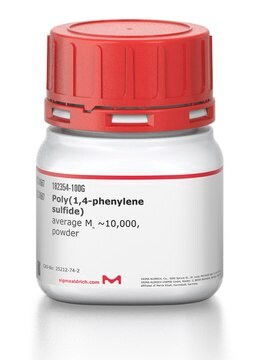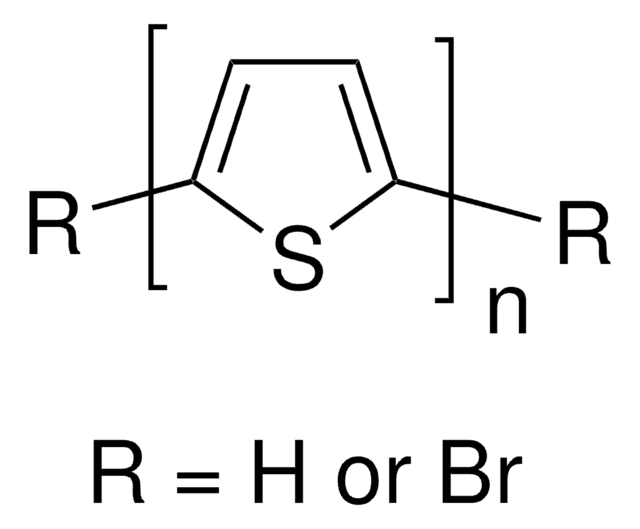Recommended Products
agency
suitable for controlled release
Quality Level
form
viscous liquid
mol wt
average Mw 15000
color
colorless
application(s)
advanced drug delivery (tissue engineering, medical devices)
storage temp.
2-8°C
Related Categories
General description
Poly(propylene sulfide) (PPS) is a thermoplastic polymer that has shown potential for use in various biomedical applications due to its biocompatibility, biodegradability, and tunable mechanical and chemical properties.
Application
One promising application of PPS is in drug delivery. PPS nanoparticles can be synthesized and loaded with drugs, providing sustained release and targeted delivery to specific tissues or cells. PPS also has good stability in biological environments, which is important for maintaining drug efficacy during storage and delivery.
PPS has also been explored as a material for tissue engineering. Its biocompatibility and ability to be tailored for specific mechanical and chemical properties make it a potentially useful scaffold material for various tissue types, including bone and cartilage. PPS has also been shown to support cell attachment and growth in vitro.
In addition to drug delivery and tissue engineering, PPS has also been investigated for use in medical devices such as catheters and sutures. Its chemical resistance and low toxicity make it a potential alternative to traditional materials like silicone and nylon. Overall, PPS has shown promise for various biomedical applications, and ongoing research is exploring its potential in areas such as wound healing, cancer therapy, and regenerative medicine.
PPS has also been explored as a material for tissue engineering. Its biocompatibility and ability to be tailored for specific mechanical and chemical properties make it a potentially useful scaffold material for various tissue types, including bone and cartilage. PPS has also been shown to support cell attachment and growth in vitro.
In addition to drug delivery and tissue engineering, PPS has also been investigated for use in medical devices such as catheters and sutures. Its chemical resistance and low toxicity make it a potential alternative to traditional materials like silicone and nylon. Overall, PPS has shown promise for various biomedical applications, and ongoing research is exploring its potential in areas such as wound healing, cancer therapy, and regenerative medicine.
Features and Benefits
- Biocompatible
- Biodegradable
- Tunable mechanical and chemical properties
- Ideal for sustained release and targeted delivery
- Chemically resisitant and low toxicity
Storage Class
10 - Combustible liquids
wgk_germany
WGK 3
flash_point_f
Not applicable
flash_point_c
Not applicable
Choose from one of the most recent versions:
Certificates of Analysis (COA)
Lot/Batch Number
Don't see the Right Version?
If you require a particular version, you can look up a specific certificate by the Lot or Batch number.
Already Own This Product?
Find documentation for the products that you have recently purchased in the Document Library.
Extracellular matrix binding mixed micelles for drug delivery applications
O'Neil P N, et al.
Journal of Controlled Release : Official Journal of the Controlled Release Society, 137, 146-151 (2009)
Accelerated wound healing by injectable star poly(ethylene glycol)-b-poly(propylene sulfide) scaffolds loaded with poorly water-soluble drugs
Zhu S, et al.
Journal of Controlled Release : Official Journal of the Controlled Release Society, 282, 156-165 (2018)
In vivo targeting of dendritic cells in lymph nodes with poly(propylene sulfide) nanoparticles
Reddy T S, et al.
Journal of Controlled Release : Official Journal of the Controlled Release Society, 112, 26-34 (2006)
Our team of scientists has experience in all areas of research including Life Science, Material Science, Chemical Synthesis, Chromatography, Analytical and many others.
Contact Technical Service







